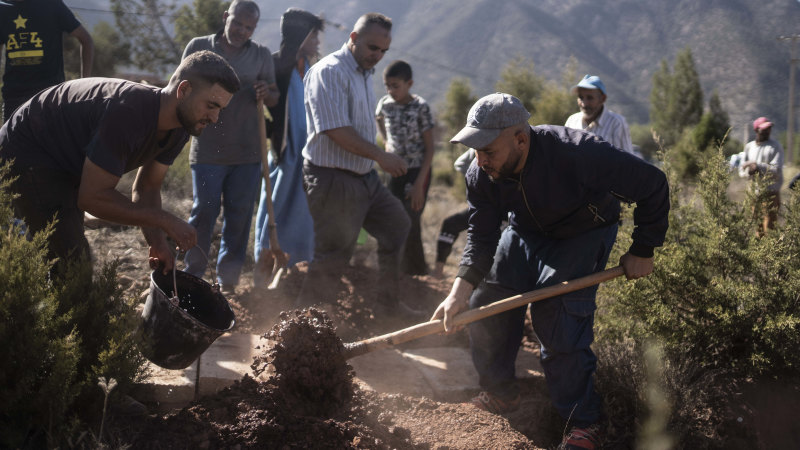Aftershock rattles mourners, rescuers as death toll continues to rise
Save articles for later
Add articles to your saved list and come back to them any time.
Amizmiz: An aftershock rattled Moroccans on Sunday as they mourned victims of the nation’s strongest earthquake in more than a century and sought to rescue survivors while soldiers and aid workers raced to reach ruined mountain villages. The disaster killed more than 2100 people – a number that is expected to rise.
The United Nations estimated that 300,000 people were affected by Friday night’s magnitude 6.8 quake and some Moroccans complained on social networks that the government wasn’t allowing more outside help. International aid crews were poised to deploy, but some grew frustrated waiting for the government to officially request assistance.
People dig a grave to bury bodies of victims of the earthquake in a village near Marrakesh.Credit: AP
“We know there is a great urgency to save people and dig under the remains of buildings,” said Arnaud Fraisse, founder of Rescuers Without Borders, who had a team stuck in Paris waiting for the green light. “There are people dying under the rubble, and we cannot do anything to save them.”
Help was slow to arrive in Amizmiz, where a whole chunk of the town of orange and red sandstone brick homes carved into a mountainside appeared to be missing. A mosque’s minaret had collapsed.
“It’s a catastrophe,” said villager Salah Ancheu, 28. “We don’t know what the future is. The aid remains insufficient.”
Residents swept rubble off the main unpaved road into town and people cheered when trucks full of soldiers arrived. But they pleaded for more help.
“There aren’t ambulances, there aren’t police, at least for right now,” Ancheu said.
Those left homeless – or fearing more aftershocks – slept outside Saturday, in the streets of the ancient city of Marrakesh or under makeshift canopies in hard-hit Atlas Mountain towns like Moulay Brahim. The worst destruction was in rural communities that are hard to reach because the roads that snake up the mountainous terrain were covered by fallen rocks.
Those areas were shaken anew Sunday by a magnitude 3.9 aftershock, according to the US Geological Survey. It wasn’t immediately clear if it caused more damage or casualties, but it was likely strong enough to rattle nerves in areas where damage has left buildings unstable and residents feared aftershocks.
Friday’s earthquake toppled buildings not strong enough to withstand such a mighty temblor, trapping people in the rubble and sending others fleeing in terror. A total of 2122 people were confirmed dead and at least 2421 others were injured – 1404 of them critically, the Interior Ministry reported.
Most of the dead – 1351 – were in the Al Haouz district in the High Atlas Mountains, the ministry said.
Flags were lowered across Morocco, as King Mohammed VI ordered three days of national mourning starting Sunday. The army mobilised search and rescue teams, and the king ordered water, food rations and shelters to be sent to those who lost homes.
He also called for mosques to hold prayers Sunday for the victims, many of whom were buried Saturday amid the frenzy of rescue work nearby.
The epicentre of Friday’s quake was near the town of Ighil in Al Haouz Province, about 70 kilometres south of Marrakesh. The region is known for scenic villages and valleys tucked in the High Atlas Mountains.
Devastation gripped each town along the High Atlas’ steep and winding switchbacks, with homes folding in on themselves and people crying as boys and helmet-clad police carried the dead through the streets.
“I was asleep when the earthquake struck. I could not escape because the roof fell on me. I was trapped. I was saved by my neighbours who cleared the rubble with their bare hands,” said Fatna Bechar in Moulay Brahim. “Now, I am living with them in their house because mine was completely destroyed.”
There was little time for mourning as survivors tried to salvage anything from damaged homes.
Khadija Fairouje’s face was puffy from crying as she joined relatives and neighbours hauling possessions down rock-strewn streets. She had lost her daughter and three grandsons aged four to 11 when their home collapsed while they were sleeping less than 48 hours earlier.
“Nothing’s left. Everything fell,” said her sister, Hafida Fairouje.
In Marrakesh, large chunks were missing from a crenelated roof, and warped metal, crumbled concrete and dust were all that remained of a building cordoned off by police.
Tourists and residents lined up to give blood.
“I did not even think about it twice,” Jalila Guerina said, “especially in the conditions where people are dying, especially at this moment when they are needing help, any help.”
AP
Get a note directly from our foreign correspondents on what’s making headlines around the world. Sign up for the weekly What in the World newsletter here.
Most Viewed in World
From our partners
Source: Read Full Article


